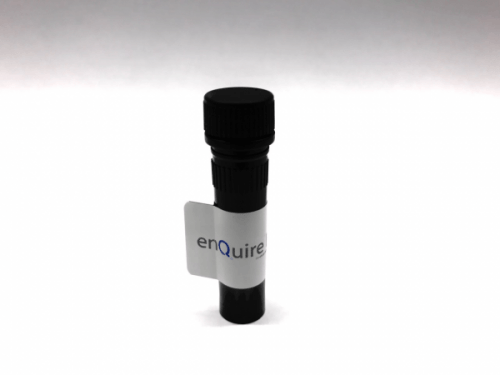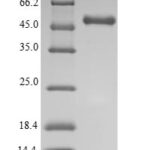Mouse IDO1 / IDO Recombinant Protein Product Attributes
Product Type: Recombinant Protein
Recombinant IDO1 / IDO based upon sequence from: Mouse
Host: QP9192 protein expressed in Yeast.
Tag: His
Protein Construction: A DNA sequence encoding the Mus musculus (Mouse) IDO1 / IDO, was expressed in the hosts and tags indicated. Please select your host/tag option, above.
Application Notes: Please contact us for application specific information for QP9192.
Bioactivity Data: Untested
Full Length? Full Length
Expression Region: Met1 – Pro407
Amino Acid Sequence: MALSKISPTE GSRRILEDHH IDEDVGFALP HPLVELPDAY SPWVLVARNL PVLIENGQLR EEVEKLPTLS TDGLRGHRLQ RLAHLALGYI TMAYVWNRGD DDVRKVLPRN IAVPYCELSE KLGLPPILSY ADCVLANWKK KDPNGPMTYE NMDILFSFPG GDCDKGFFLV SLLVEIAASP AIKAIPTVSS AVERQDLKAL EKALHDIATS LEKAKEIFKR MRDFVDPDTF FHVLRIYLSG WKCSSKLPEG LLYEGVWDTP KMFSGGSAGQ SSIFQSLDVL LGIKHEAGKE SPAEFLQEMR EYMPPAHRNF LFFLESAPPV REFVISRHNE DLTKAYNECV NGLVSVRKFH LAIVDTYIMK PSKKKPTDGD KSEEPSNVES RGTGGTNPMT FLRSVKDTTE KALLSWP
Purity: Greater than 90% as determined by SDS-PAGE.
Reconstitution Instructions:
Concentration of Mouse IDO1 / IDO Protein:
Endotoxin Levels: Not determined.
Buffer: Tris-based buffer, 50% glycerol
Storage Conditions: Store at -20C to -80C.
| Recombinant Mouse IDO1 / IDO Protein General Information | |
|---|---|
| Curated Database and Bioinformatic Data | |
| Gene Symbol | IDO1 |
| Entrez Gene ID | 15930 |
| Ensemble Gene ID | ENSMUSG00000031551 |
| RefSeq Protein Accession(s) | NP_001280619.1 |
| RefSeq mRNA Accession(s) | NM_001293690.1, NM_008324.2 |
| UniProt ID(s) | P28776 |
| UniGene ID(s) | Mm.392 |
| COSMIC ID Link(s) | IDO1 |
| KEGG Gene ID(s) | mmu:15930 |
| General Description of Recombinant Mouse IDO1 / IDO Protein. | |
| Catalyzes the first and rate limiting step of the catabolism of the essential amino acid tryptophan along the kynurenine pathway. Involved in the peripheral immune tolerance, contributing to maintain homeostasis by preventing autoimmunity or immunopathology that would result from uncontrolled and overreacting immune responses. Tryptophan shortage inhibits T lymphocytes division and accumulation of tryptophan catabolites induces T-cell apoptosis and differentiation of regulatory T-cells. Acts as a suppressor of anti-tumor immunity (PubMed:25691885). Limits the growth of intracellular pathogens by depriving tryptophan. Protects the fetus from maternal immune rejection | |
Limitations and Performance Guarantee
This is a life science research product (for Research Use Only). This product is guaranteed to work for a period of two years when stored at -70C or colder, and one year when aliquoted and stored at -20C.





There are no reviews yet.